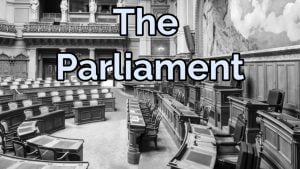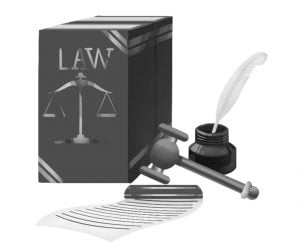Process of law making in Canada: The enactment of laws is a key responsibility of the legislature. The House of Commons and the Senate have the legal duty and power to enact laws which govern the conduct of persons and authorities in Canada. These laws may be enacted to apply to everyone or a specific group of people. They are usually enacted to give effect to the policy objectives of the government or prohibit an activity.

There are stages through which a proposed law goes before it becomes a law. These are processes which the Parliament is required to follow in order to enact a law.
The process of enactment of laws by the Parliament starts with the introduction of a bill. The bill may be introduced in either the House of Commons or the Senate. It may be introduced to the House by a Government Minister or a private Member of the Parliament. The Minister or private Member who wishes to introduce the bill must give a notice to the Speaker 48 hours before it is introduced to the Parliament. The Speaker will then grant leave to the Minister or the private Member to introduce the bill. Following the granting of the leave, the bill will be presented to the Clerk of the House, where the bill will be considered.
Once the bill is introduced, it will then be required to go through prescribed processes or stages before it becomes a law.

MUST READ: Process of law making in Nigeria: Stages of a bill
Process of Law Making In Canada: 6 Major Stages
1. FIRST READING: Following the introduction of a bill to the House, the bill goes through first reading. The first reading involves the formal presentation of a bill to the House. The purpose of this process is to notify the members of the House of the bill.
At this point, the private Member or Minister who introduced the bill will be given the floor to address the members of the House on the bill. Afterwards, the members of the House would agree that debate on the bill be postponed to the next sitting of the House.
The bill then be printed in its first reading form. In some cases, explanatory notes are attached to explain the objective of the bill.
2. SECOND READING: This stage follows the first reading. During the second reading, the basis and the goal of the bill is debated by the members of the House.
The members of the House may express their positions on the principle of the bill, either in support of the bill or take a stance against the rationale for the bill.
Also see: Major problems in the United States Education System
3. COMMITTEE STAGE: Usually, the bill is referred to a committee for further consideration when it passes the second reading. However, in some cases, the bill may be referred to a committee before it goes through second reading.
The committee stage is an essential phase of the enactment of laws. This is because of the vital role which the committee plays in ensuring the propriety of the bill, both in form and in content.
The committee members are responsible for considering the bill in detail and subjecting it to scrutiny. They analyse the contents of the bill, the likely effects of the proposed law and other connected matters. The Government Minister who sponsored a bill which is being considered by the committee can participate in the meetings and deliberations of the committee. In the absence of the Minister, the Parliamentary Secretary can attend the meetings of the committee. The Minister and the Parliamentary Secretary attends the meetings of the committee to articulate the standpoint of the Government on the bill.
In addition to scrutinising the bill, the committee can also recommend additional amendments to the bill.
Also see: Cheapest universities to attend in Canada 2021
4. THIRD READING: This is the stage for the consideration of the bill in its final form by the House. At this stage, the members of the House deliberate on the objective, content and form of the bill. Additionally, the House will instruct that the bill be printed in its third reading form, and this captures the amendments made to the bill.
The third reading stage is also the adoption stage. Following the consideration of the bill, the House may then adopt it if the majority of members are in support of it. The adoption of the bill marks the completion of the enactment process in the House where the bill is being considered.
Following the adoption of the bill by the House, the bill will then be sent to the other House for consideration and adoption. For example, if the bill originated in the House of Commons, it will be sent to the Senate after its adoption by the House of Commons. The Senate will then go through the processes discussed above.
5. ROYAL ASSENT: This is the final phase in the enactment of a law. This follows the consideration and adoption of the bill by both the House of Commons and the Senate.
Once a bill has been adopted by the two Houses of Parliament, it is then sent to the Governor General for assent. The assent may be given by a written declaration by the Governor General or the representative of the Governor General. On the other hand, it may given by the Governor General or the Governor General’s representative in an official ceremony at the Senate, before the members of the two Houses.
6. COMING INTO FORCE: Generally, the law comes into force once the Governor General or the representative of the Governor General assents to it. However, the law may provide that it or some of its provisions will come into force on the day designated by an order of the Governor in Council. In such cases, the law will come into force on the day designated by the order.

Also see: How to become a successful lawyer in Canada
Important Considerations in the Making Of Laws
The Parliament has the duty and power to make laws. The proposed law may be sponsored by a Government Minister or a private Member. Where the bill is a Government bill, it is sponsored by a Minister and in other cases, a private Member may sponsor the bill. An agency or department of the Government may also draft a bill.
There are important factors which must be taken into account when proposing a law. The Minister, Government agency or the private Member who seeks to draft a bill must take these circumstances into consideration.
THE LANGUAGE REQUIREMENT
The Constitution Act, 1867 recognizes French and English languages as Canada’s official languages. Both languages enjoy equality of status, rights and privileges in all the institutions of government and the Parliament.
In drafting a bill, the Minister, private Member or agency must ensure that the bill is prepared in the two languages. Also, the objective and the content of the bill must be clearly and accurately expressed in the two languages.
Also see: Best time to read and understand effectively
BIJURAL NATURE OF THE LEGAL SYSTEM
Both the civil law and the common law legal systems operate in Canada. It is therefore necessary for the laws made by Parliament to reflect this disposition.
In drafting a bill, the Minister, private Member and Government agency must ensure that the intention and content of the bill reflect and align with the concepts and principles of the two legal systems combined.
Before I conclude, I recommend that you watch the YouTube video below for more information on the Process of law making in Canada. Trust me, you will love it.
Also see: Types of constitution you should know
Conclusion
There are statutory processes which the Parliament must follow in order to make a law. These begin with the introduction of the bill and then ends with the giving of the Royal Assent. Each stage is indispensable to the enactment of a law. The bill becomes a law and comes into force when these processes are completed.
In addition to the stages of the enactment of the law, the Minister, private Member or agency must take special factors into account when drafting the law. The Parliament must also ensure that these requirements are fulfilled before passing the law.

Edeh Samuel Chukwuemeka, ACMC, is a lawyer and a certified mediator/conciliator in Nigeria. He is also a developer with knowledge in various programming languages. Samuel is determined to leverage his skills in technology, SEO, and legal practice to revolutionize the legal profession worldwide by creating web and mobile applications that simplify legal research. Sam is also passionate about educating and providing valuable information to people.